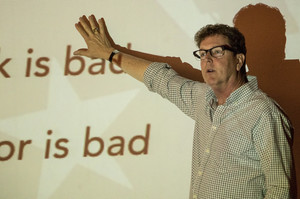Elmore shines light on technology and generational differences

CHADRON – During a presentation Sept. 29, in the Chadron State College Student Center Ballroom Dr. Tim Elmore explored the communication gap that can occur due to technology ubiquitous in teen and young adults’ lives.
The program was organized by CSC students enrolled in Survival Skills (FYI 169x) taught by Dr. Kim Madsen, who uses Elmore’s books and videos in her classes.
Elmore, president of Growing Leaders, has coined the term “iY” to refer to the cohort of youth with constant access to technology.
“It is no longer accurate to refer to Generation Y as one collective generation. The Millennials born after 1990 are a whole new batch of students. You are being called Generation iY because your lives are dominated by the iPhone, the iPod, iTunes, etc. You’ve been identified as the Digital Generation, Mosaics, Techies, Millennials and Screenagers,” he said. “You are the most studied generation ever and surveys indicate your peers equate access to technology with air and water. They’d rather lose a little finger than their phone.”
He explained changes in technology also affect the economy.
“Instead of climbing the corporate ladder like your parents or grandparents, you will likely hop from one corporate lily pad to another. This is a gig economy. Incentives are different,” Elmore said.
Elmore encouraged students to live by their values instead of following the crowd. He used the comparison of thermometers and thermostats to make his point.
“Don’t be a thermometer just reflecting what’s around you. Be a thermostat. Set the temperature, tenor and tone of conversations. Add value to everything you are involved with,” Elmore said.
Using images of a river and a flood, Elmore urged the audience members to bring focus and clarity to their lives like a river in a channel, rather than a flood covering ground.
“You can’t do everything at once. Brain research has proven there is no such thing as multitasking. You do a single task at a time and switch quickly between tasks,” Elmore said.
Elmore cautioned the crowd to be aware of unintended consequences of a culture filled with immediate gratification, noting that tasks that are slow, boring and laborious should not be viewed negatively because they don’t match students’ usual expectations.
“Neuro scientists are finding that boredom can lead to creativity and empathy, so it’s not all bad. Sometimes the counterintuitive is what we need,” he said. “You can be more intentional. You can work to increase your self-awareness, self-management, social awareness and relationship management skills. Moral intelligence is a valuable asset. Too often pragmatism trumps principal.”
Category: Campus Events, Campus News


